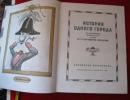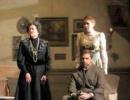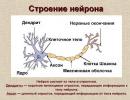Chouans, sans-culottes and the deputy swamp. Whose hands made the French Revolution. Sans-culottes and the French Revolution What are sans-culottes
I was asked here to tell you about the sans-culottes costume.
Sans-culottes (from French sans - without and culotte - short pants) - a term from the time of the French Revolution. The aristocrats called sans-culottes the representatives of the urban poor, who, unlike the nobles, wore not short, but long trousers. Soon, from a contemptuous nickname, this word turned into a self-name of revolutionary-minded people from the "bottom". Sometimes "sans-culottes" are translated as "hollow pants", which, of course, is not true, although in English caricatures of that time sans-culottes are often depicted without pants at all.
The sans-culotte costume is depicted in many images of that time. For example, the well-known painting by Louis-Leopold Boilly (Boylly), depicting the standard-bearer at the festival of the Federation in 1792
The men's costume consisted of a short jacket - "carmagnole" (carmagnole), widespread among sailors (the fashion for such jackets appeared along with the "La Marseillaise", which was sung by a detachment of volunteers from Marseille at the entrance to Paris in 1792), long sailor pantaloons ( matelots), a red Phrygian cap with a national cockade, a shirt without a frill, a loosely tied scarf tie. A short vest was worn under the pocket. In cold weather, they put on a long frock coat or a cloak made of thick brown or gray cloth.
The costume was complemented by a red belt-sash, woolen stockings, shoes or folk wooden shoes - clogs. The spread of long pantaloons led to the appearance of suspender straps instead of a belt, which from that time became part of the European costume.

Red "Phrygian cap".
A similar headdress was known in ancient times. In particular, it was worn in Phrygia (in Asia Minor), in Persia, etc. The Iranian god Mithra was depicted in a red Phrygian cap. In the Roman Empire, it was worn by released slaves. In pre-revolutionary France, a similar headdress was worn by sailors and galley convicts, and during the years of the revolution it became a symbol of the liberation of the people. 
A man dressed in a sans-culotte tries on a red cap. A discarded wig and a three-cornered hat are lying nearby.
During the years of the Jacobin dictatorship and the Terror, many bourgeois and former "aristocrats" wore sans-culottes so as not to stand out from the revolutionary crowd. (About the same thing happened after 1917, when hats, etc., disappeared from everyday life. A hat could be lost along with the head.)
Triumph of Marat. From a painting by Boilly, 1794
Speaker on the podium. 
Planting the "freedom tree". 
The women's costume consisted of an undershirt and an upper short double-breasted jacket without a corset or a sweater, an apron, and a straight free-form cloth skirt that was mid-calf length; at the waist - belt-scarf. On top they wore a kanza (French canezou - a short blouse) - a large scarf made of light fabric or lace, crossing the ends on the chest and tying them at the waist. Cap-shaped headdress. 
Campaign of women to Versailles on October 5, 1789 (Colorized engraving of the time) 
The sans-culottes suit was distinguished by practicality, simplicity and convenience. And the men's suit, borrowed from sailor's clothing, was already very reminiscent of modern.
Pantaloons, skirts and vests made of striped fabric were in fashion.
Political symbols played an important role in the costume. This was expressed in the obligatory wearing of the national cockade and the predominance of "national colors" in the decoration of the costume - red, white and blue.
On the basis of sans-culottes clothing, a number of official or semi-formal forms of dress for officials and public figures arose, such as members of revolutionary committees, municipal police, prison guards, etc. 
The creation of mass armies and the lack of uniforms led to the fact that the revolutionary soldiers (especially volunteers) had a very colorful appearance. The uniform was combined with elements of civilian clothing. Soldiers and officers dressed in tatters, if possible, decorated themselves with blue-white-red sultans, scarves, etc., presenting a rather picturesque sight.
Rhine army. 1796
This drawing by a German artist dates back to the time of the Directory. The soldiers and officers of the Italian army of Bonaparte looked about the same.
sans-culottes(fr. sans culottes) - the name of the revolutionary-minded poor people in Paris during the French Revolution. The word comes from the expression sans culotte, i.e. "without culottes"; in the 18th century, men from wealthy classes wore culottes (they are also breeches, that is, short tight-fitting pants just below the knees) with stockings, while the poor and artisans wore long trousers.
On July 14, 1789, the Parisian sans-culottes broke into the armory of the royal soldiers and stole 30,000 muskets there. Then, having distributed their weapons, the Parisians went to the Bastille. A fierce battle broke out, after which the prison garrison capitulated. The uprising engulfed all of France.
With the outbreak of the revolutionary wars in April 1792, the sans-culottes played a predominant role in the National Guard, stormed the Tuileries Palace in August and overthrew the monarchy. And then they dominated the organs of local revolutionary self-government.
In June 1793, they helped the Jacobins come to power, and in September they forced the Convention to deploy terror. With its beginning, many civil servants began to dress "a la sans-culotte". The sans-culottes themselves demanded more control over prices and incomes, accusing the government of being too liberal.
In 1792-1795. sans-culottes began to figuratively refer to any radical revolutionaries.
The sans-culottes supported the most radical revolutionary politicians - Hébert, then Robespierre and the Committee of Public Safety.
After the fall of Robespierre, the sans-culottes lost political influence.
Literature
Encyclopædia Britannica Eleventh Edition (1910-1911)
Source: http://ru.wikipedia.org/wiki/Sans-culottes
Great French Revolution 1789-1794
Abstract >> HistoryTo the building of the Convention. Together with sans-culottes(« sans-culottes"(“sans-culottes”) were then called democratic ..., the Jacobins met the demands sans-culottes. On September 5, it was accepted ... the army, which consisted of the Paris sans-culottes. In order to streamline the supply...
Great French Revolution (5)
Abstract >> HistoryInfluence and pressure of the masses ( sans-culottes) and in some cases were ... and then Spain. 8. Jacobin dictatorship Sansculotte(Louis-Léopold Boilly) In March 1793 ... . L., 1989. Revunenkov V. G. Parisian sans-culottes era of the French Revolution. L., 1971 ...
September murders
Abstract >> HistoryContributed to the September massacres. Among sans-culottes Paris, who won on August 10, ... a signal to speak. Therefore, among sans-culottes the idea of \u200b\u200bpunishing the prisoners in ... therefore he was saved by those who recognized him sans-culottes. After...
-
The section is very easy to use. In the proposed field, just enter right word, and we will give you a list of its values. It should be noted that our site provides data from different sources- encyclopedic, explanatory, derivational dictionaries. Here you can also get acquainted with examples of the use of the word you entered.
The meaning of the word sans-culottes
sans-culottes in the crossword dictionary
Encyclopedic Dictionary, 1998
sans-culottes
SANCULOTTES (from the French sans - without and culotte - short pants) is a term from the time of the French Revolution. The aristocrats called sans-culottes the representatives of the urban poor, who, unlike the nobles, wore not short, but long trousers. During the years of the Jacobin dictatorship, sans-culottes were the self-designation of the revolutionaries.
sans-culottes
(French sans-culottes, from sans ≈ without and culotte ≈ short pants), a term used during the French Revolution. Initially, the S. aristocrats contemptuously referred to their political opponents as representatives of the urban poor, who wore long trousers made of coarse fabric (in contrast to the nobles and bourgeois, who wore short trousers with silk stockings). later (especially during the years of the Jacobin dictatorship), the term "S." becomes the self-name of a patriot, a revolutionary.
Lit .: Sobul A., Parisian sans-culottes during the Jacobin dictatorship, [transl. from French], M., 1966.
Wikipedia
sans-culottes
sans-culottes- the name of the revolutionary-minded representatives of the "third estate" in Paris during the French Revolution, mainly bourgeois.
The word comes from the expression sans culotte, i.e. "without culottes": in the 18th century, noble men from the upper classes wore culottes (short tight pants just below the knees) with stockings, and the poor and artisans wore long trousers.
On July 14, 1789, the Parisian sans-culottes broke into the armory of the royal soldiers and captured about 30 thousand muskets there. Then, having distributed their weapons, the Parisians went to the Bastille. A battle broke out, after which the prison garrison capitulated. The uprising engulfed all of France.
Since the beginning revolutionary wars in April 1792, the sans-culottes played a predominant role in the National Guard, in August they stormed the Tuileries Palace and overthrew the monarchy. After the above events, the sans-culottes dominated the organs of revolutionary local self-government.
In June 1793 they helped the Jacobins to come to power and in September forced the Convention to unleash the Terror. With its beginning, many civil servants began to dress "a la sans-culotte". The sans-culottes themselves demanded more control over prices and incomes, accusing the government of being too liberal.
In 1792 - 1795, any radical revolutionaries began to be figuratively called sans-culottes.
The sans-culottes supported the most radical revolutionary politicians - Hébert, then Robespierre and the Committee of Public Safety.
After the fall of Robespierre, the sans-culottes lost political influence.
Examples of the use of the word sans-culottes in the literature.
With wild cries sans-culottes hundreds of hands seize him, plaintively begging for mercy, and drag him through the Place de Greve to the lamp at the corner of the Rue Vannery, in order to hang him up.
Woe to the country that is being trampled sans-culottes, menacingly knocking wooden shoes on the day of vengeance!
Maenads and sans-culottes they huddle in the guardhouses, the barracks of the Flanders, where cheerful fires burn, and if there was not enough space, then in churches, government offices, gatehouses - wherever poverty can take shelter.
Stunned, shining seigneurs stand biting their nails: these sans-culottes don't run like chickens!
Freedom equality Brotherhood - sans-culottes they will look for these things not in a money bag, but in another place.
Here is such an intricate upheaval of all trade relations sans-culottes want to maintain their existence, since it is impossible otherwise.
Nevertheless, the Gironde insisted on the creation of the Commission of the Twelve, a commission specially appointed to investigate the disturbances in the legislative sanctuary: let sans-culottes say what they want, the rule of law must prevail.
The soldiers of Lafayette's army, like all soldiers, have a vague feeling that they themselves sans-culottes in leather belts that the victory on August 10 is their victory.
In many cases sans-culottes- the self-name of the revolutionaries who supported the Jacobin dictatorship or opposed it from the extreme left.
Jacobins and sans-culottes strove for the same social transformation in the interests of the petty-bourgeois majority that the Legislative Assembly strove for.
Let us now take a look at the great French sans-culottes, at this miracle of the revolution - is it moving, is it growing? Indeed, in it alone lies still hope for France. Since decree after decree comes from the Mountain, like creative fiats, then, according to the nature of things, the miracle of the revolution grows rapidly in these days, develops one limb after another and assumes terrible dimensions. In March 1792, we saw how all of France, seized with blind horror, ran to lock up the city outposts, boiled pitch for the robbers. This March, we are happier because we can face the horror, because we have a creative Mountain that can say fiat. Recruitment proceeds with fierce speed, but our volunteers are slow to act until treason is punished at home: they do not strive for borders, but rush back and forth with demands and denunciations. The mountain is forced to say new fiat and new fiats.
And doesn't she do it? Let us take for the first example the so-called Comites revolutionnaires for the arrest of suspicious persons. Revolutionary committees, consisting of 12 elected patriots, sit in every city hall in France, interrogate suspects, search for weapons, carry out house searches and arrests - in a word, they make sure that no harm is done to the Republic. Their members, elected by popular vote, each in his own section, represent a kind of quintessential Jacobinism; about 44 thousand such persons vigilantly watch over France! In Paris, and in all other cities, the door of every house must be legibly inscribed with the names of the tenants "at a height not exceeding five feet from the ground"; every citizen must present his Carte de civisme, signed by the chairman of the section; everyone should be ready to give an account of their convictions. Truly, it is better for suspicious persons to flee from this soil of Freedom! But it is also not safe to leave: all emigrants are declared traitors; their property passes into national ownership, they are outside the law, "dead in law", of course, with the exception that for our needs they will be "alive before the law for another fifty years", and the inheritance that falls to their share during this time is also recognized as national property! The crazy vital energy of Jacobinism, with 44,000 centers of activity, circulates through all the veins of France.
Notable also is the Tribunal Extraordinaire20 decreed by the Mountain; moreover, some Girondins opposed this measure, since such a judgment is undoubtedly contrary to all forms, while others from their party agreed, even promoted its adoption, because ... O people of Paris, do not we all equally hate traitors? The Tribunal of the Seventeenth, established last autumn, acted quickly, but this one will act even faster. Five judges, permanent jurors, who are appointed from Paris and the surrounding area in order to avoid wasting time on elections; this court is not subject to appeal, excludes almost all procedural forms, but must be "convinced" as soon as possible and, for greater fidelity, must "vote aloud" for the Parisian public. Such is the Tribunal Extraordinaire, which, after a few months of busiest activity, will be renamed the Tribunal Revolutionnaire, as it has called itself from the very beginning. With Herman or Dumas as president, with Fouquier-Tinville as Attorney General, and with a jury of men like Citizen Leroy, who gave himself the nickname Dix Aout (Leroy the Tenth of August), this trial will be the wonder of the world. In his person the sans-culottes have created for themselves a sharp sword, a magical weapon dipped in the infernal waters of the Styx, for the blade of which any shield, any defense, by force or cunning, will be too weak; he will mow down lives and break iron gates, his swing will fill the hearts of people with horror.
But, speaking of the formation of amorphous sans-culottes, should we not first of all determine how the formless received a head. It will not be a metaphor if we say that the existing revolutionary government continues to be in a very anarchic state. There is an executive council of ministers, consisting of six members, but they, especially after the departure of Roland, hardly knew themselves whether they were ministers or not. The highest authority over them is the committees of the Convention, all equal in importance; twenty-one, defense, public safety committees are appointed simultaneously or one after the other for special purposes. Almighty is the Convention alone, especially if the Commune is at one with it; but it is too numerous for the administrative corps. Therefore, at the end of March, in view of the dangerous situation of the Republic, which is in rapid rotation, a small Comite de Salut Public21 is created, apparently for various random cases that require urgent solution, but in reality, it turns out, for a kind of general supervision and general enslavement. The members of this new committee must report weekly on their activities, but they confer in secret. There are nine of them, and they are all staunch patriots, one of them is Danton; the composition of the committee should be renewed every month, but why not re-elect them if they are successful? The crux of the matter is that there are only nine of them and they sit in secret. At first glance, this committee seems to be a secondary body, but it has the makings for development! He is favored by the happiness and inner energy of the Jacobins, he will force all the committees and the Convention itself into mute obedience, turn six ministers into six diligent scribes, and will do his will for a while on earth and under heaven. The world still trembles and cries before this Committee.
If we called this Revolutionary Tribunal a sword that the sans-culottes forged for themselves, then the "maximum law" can be called a sack of provisions or a knapsack in which, after all, you can still find a portion of bread. It is true that this upsets political economy, the Girondinian freedom of trade and all the laws of supply and demand, but what is to be done? Patriots need to live, and greedy farmers apparently don't have a heart. Therefore, the "maximum law" that fixes marginal prices for grain and was approved after endless efforts22 will gradually spread to all types of food, but one can imagine after what fights and commotion! What to do, for example, if a peasant does not want to sell his goods? Then he must be forced to do so. He must give the established authorities accurate information about his stock of grain, and let him not exaggerate, because in this case his income, tax and indemnity will rise correspondingly; but let him not underestimate, because by the appointed day, let's say in April, less than one third of the declared amount should remain in the barns, and more than two thirds should be threshed and sold. They can report on him, and they will take a fine from him.
It is by this intricate reversal of all commercial relations that the sans-culottes wish to maintain their existence, since this is otherwise impossible. In general, things took such a turn that, as Camille Desmoulins once said, "while the sans-culottes are fighting, the gentlemen must pay." Then there are Impots progressifs (progressive taxes), with rapidly increasing gluttony, absorbing the "surplus income" from people: those who have more than 50 louis a year are no longer exempt from taxation; if the income is in the hundreds, then a thorough bloodletting is done, and if in the thousands and tens of thousands, then the blood flows in streams. Then there are requisitions, "a forced loan of a billion", to which, of course, everyone who has something must subscribe. An unprecedented phenomenon: France has reached the point where it has become a country not for the rich, but for the poor! And then if anyone decides to run, what is the use? Death before the law or life for another 50 years for their damn needs! Thus, under the singing of "Ca ira" everything goes topsy-turvy; at the same time going on: endless sales of the national property of emigrants, and Cambon pours banknotes, as if from a cornucopia. The commerce and finances of the sans-culottes and their galvanic existence with fixed maximum prices and queues at bakeries, with greed, hunger, denunciations and paper money; their beginning and end remain the most interesting chapter of political economy yet to be written.

sans-culottes(fr. sans-culottes) - the name of the revolutionary-minded poor people in Paris during the French Revolution. The word comes from the expression sans culotte, that is, “without culottes”: in the 18th century, men from wealthy classes wore culottes (short tight pants just below knees) with stockings, while the poor and artisans wore long trousers. The sans-culottes actively participated in the activities of revolutionary committees and Parisian sections and played a decisive role in the overthrow of the monarchy and the Girondins, acted under the leadership of the "mad", Hebertists as active conductors of revolutionary terror, radical economic and social measures. royal soldiers and stole about 30 thousand muskets there. Then, having distributed their weapons, the Parisians went to the Bastille. A battle broke out, after which the prison garrison capitulated. The uprising engulfed all of France. With the outbreak of the revolutionary wars in April 1792, the sans-culottes played a predominant role in the National Guard, stormed the Tuileries Palace in August and overthrew the monarchy. After the above events, the sans-culottes dominated the organs of revolutionary local self-government. In June 1793, they helped the Jacobins come to power and in September forced the Convention to deploy terror. With its beginning, many civil servants began to dress "a la sans-culotte". The sans-culottes themselves demanded greater control over prices and incomes, accusing the government of excessive liberalism. In 1792-1795, any radical revolutionaries began to be figuratively called sans-culottes. On days 9-10 of Thermidor, in these troubled hours of confusion and disorientation ordinary people in the sections, bewildered by the mutually exclusive orders of the Convention and the Commune, the sans-culottes of Paris, driven by revolutionary instinct, came to the defense of the Revolutionary Government, Robespierre, Saint-Just. Objections can be foreseen: not all sans-culottes supported Robespierre and the Commune, some hesitated, some came out in support of the Convention. The sans-culottes supported the most radical revolutionary politicians - Hébert, then Robespierre and the Committee of Public Safety. After the fall of Robespierre, the sans-culottes lost political influence.
The revolution removed the conflict between the state and civil society and led to a rapid decentralization of power. True, the liberal rational schemes - the separation of powers (harmony of legislative, executive and judicial power), the balance between the capital and the periphery - were not designed for similar conditions of a gigantic crisis. The revolution gave rise to a democratic state, but in the course of its development it increasingly multiplied examples of non-coincidence real practice with the theory of human rights. The principles of the "Declaration of the Rights of Man and Citizen" proclaimed by her turned out to be fundamentally utopian. Liberal structures in 1792 were supplanted by democratic and partly new authoritarian structures. The Girondins' attempt to achieve a synthesis and create a liberal democracy failed. The petty people have created their own political organizations, their own cells of power. The sans-culottes rejected liberalism in all its guises. The development of the revolution went from crisis to crisis, and state structures and mechanisms were required to overcome them. political activity of a very special kind, created not for centuries, but only for the time of exceptional circumstances. The movement towards democracy was accompanied by the rejection of some of its foundations and, thus, was at the same time a movement towards dictatorship. Politics subordinated state life, although it was for the sake of the autonomous, unhindered development of civil society that the revolution was largely carried out. The convention after the uprising of May 31 - June 2, 1793 was no longer a full-fledged representative institution. The principles of direct democracy have supplanted the principles of representative democracy. The people, in the person of the sans-culottes movement, brought to power a political grouping that was most distinguished by attention to its needs, the Jacobins were democrats, but by the will of circumstances it was they who created the dictatorship. For the sake of establishing democracy in the future, they began to eradicate democracy in the present. The incompatibility of revolutionary democracy and revolutionary dictatorship gave rise to a spiritual crisis for both Robespierre and the Jacobin Republic. In the summer of 1794, the revolutionary minority - Jacobins and sans-culottes - lost the ability to lead the country and the state.






